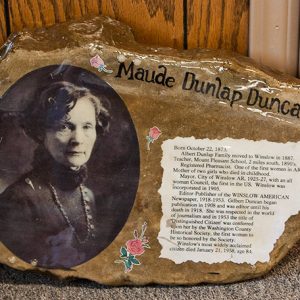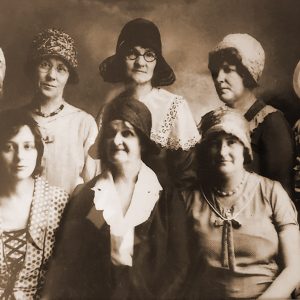calsfoundation@cals.org
Petticoat Governments
“Petticoat government” is a phrase used to describe a local government—usually a town council and mayor—in which all of the members are female. In May 1920, the same year that the Nineteenth Amendment to the U.S. Constitution was adopted, giving women the right to vote, Jackson Hole, Wyoming, elected what is believed to have been the first all-woman municipal government in the world, taking the 1916 revolution in Umatilla, Oregon—an election that saw voters elect a female majority to their town council, as well as a female mayor—to the next level. Five years later in 1925, Arkansas voters in Winslow (Washington County) followed suit in an even more resounding fashion, as the increasingly popular resort town elected local newspaper publisher and pharmacist Virginia Maud Dunlap Duncan as mayor, and then elected a town council composed of nine women.
This political evolution appears to have been a reflection both of Duncan’s prominence and of the distinctive character of Winslow, a growing tourist haven as well as one of the few rural towns in the state that offered its students an opportunity for a high school education. Duncan was a member of one of the town’s leading families, with her uncle and foster father, former Fort Smith (Sebastian County) physician Albert Dunlap, playing a major role in Winslow’s development. After visiting in the 1880s, he built a house, relocated his family, and then served as a booster for the growing area, urging friends from Fort Smith to join him. His efforts were supplemented by those of Thomas Harris, an Illinois native whose family had summered in the area and who, in the early 1900, developed Winslow Park Club on a mountain east of Winslow, a development that kicked off the town’s resort era.
All of this aside, Maud Duncan’s involvement in Winslow stemmed from her role as editor and publisher of the Winslow American, the town’s weekly newspaper. She and her husband, Gilbert, had purchased the then-monthly Winslow Mirror in 1908 and, before the year was out, had turned it into a weekly. Maud continued to head the paper after Gilbert died in the flu epidemic of 1918. Her position with the paper, coupled with her status as the town’s only registered pharmacist—and one of the few certified women pharmacists in the state—all but required her to play a prominent role in the town’s civic life.
While Mayor Duncan headed the city government, she was supported by a city council whose members featured some of the town’s leading businesswomen, including Lyda Cole, Florence Marley, Audie Crider, Bee Cherveny, Daisy Miller, Etta Black, Martin Winn (who served as treasurer), Virginia C. Dunlap, and Stella Winn (who also served as the town’s postmistress).
According to some reports, the genesis of Winslow’s petticoat government was a challenge by the town’s men who, tired of hearing increasing complaints from the town’s recently enfranchised women voters, said they should stop complaining and run for office if they thought they could do better. With Duncan, whose ownership of the paper guaranteed both strong and favorable press backing, heading the ticket as the candidate for mayor, an all-female slate consisting of local businesswomen was assembled. On Election Day, the ticket earned an unprecedented victory.
The new council members were not content with simply holding office. Rather, with Duncan as the driving force, the Winslow petticoat government undertook a couple of well-received projects. Seeking to use persuasion rather legislation, Duncan and the council encouraged residents to spruce up their homes and plant flowers, an effort that was aided by their persuasive efforts to get local merchants to reduce prices on the building materials whose use would in fact serve to better the whole community. In addition, the council raised the money needed to reroute and construct a road that ran up the steep mountainside to the west of town, one whose original incline was so severe that many drivers had to go up it backward in the cumbersome cars of the time. They convinced those who did not contribute to the building fund to perform the labor while many of the town’s women brought the laborers meals. Too, in a statement that reflected a major philosophical view, Mayor Duncan gave away the town’s small jail. Hiring outsiders to cart away the small structure, Duncan and her council colleagues chose to impose revenue-producing fines rather than jail time for those who broke minor laws. While Duncan was reported to have said, “If anyone breaks the law around here they can answer to me,” in fact, the Winslow government left it to county officials to address more serious crimes.
All of these efforts met with great acclaim, and the whole slate was reelected in 1926. Indeed, it was only their lack of a desire to seek third terms that ended their reign. But at a time when any female involvement came under great scrutiny, the government of Winslow served as a testament to what women could do if given the opportunity.
There are some reports, although none with as much supporting and substantive documentation as Winslow’s, that Arkansas was home to a number of other all-female contingents. Among these are one in Mount Nebo (Yell County) in 1924, where a group of local women, fed up with the failure of the male leaders to address the town needs in the aftermath of a major hotel fire and following the development of the state park, organized an all-female slate that swept the April elections. Their tenure saw a minor improvement in the town economic fortunes, but in general, it was a difficult time for the small community.
Mount Ida (Montgomery County) was apparently led by an all-woman city council during the 1931 and 1932 terms, a fact that got wider coverage when Huey Long and Hattie Caraway stopped in the town in the course of Caraway’s Senate campaign. Again, while documentation is scarce, it appears that by the time the women left office in 1932, the town’s debt had been erased and funds had been secured to erect a fence around the town square. In the early part of the decade, Yellville (Marion County) also seems to have boasted a city government composed entirely of women, with Virge Walton serving as mayor, O’Beta Carson as treasurer, and Lena Nowlin as recorder. They led a city council whose members included Abbie Cowdrey, Alma Berry, Elnora Record, Mag Hutchinson, and Doll Thompson.
Meanwhile the town of Humphrey (Arkansas and Jefferson counties) offers a different situation. There, according to some reports, in 1931, in the midst of the Great Depression, voters in the municipal election were presented with a ballot that had only women as candidates for city offices. However, when the actual election was held, a concerted write-in campaign on behalf of a set of local male candidates resulted in all seven of the female nominees for the offices of mayor, recorder, and five alderman seats being defeated.
Finally, during World War II, when a substantive part of the local male population was away serving in the armed forces, Melbourne (Izard County) was reportedly headed by an all-female government, with Lily Clem serving as the town’s mayor. In 1953, the town of Emerson (Columbia County) elected an all-female city council.
While some of these cases may be more a product of local legend than fact, when coupled with the undisputed efforts of the petticoat government in Winslow, they all offered early evidence of what women could do in the political arena.
For additional information:
Brotherton, Velda. Images of America: Washington County, Arkansas. Charleston, SC: Arcadia Publishing, 1999.
Dickerson, Krystle. “The Petticoat Revolution: When Women Took Over the Government,” History Hustle, July 24, 2018. https://historyhustle.com/the-petticoat-revolution/ (accessed May 23, 2019).
Kerr, Robert. “When the Women Ran Old Washington.” Arkansas Times, April 1984, pp. 21–22.
Tabler, Dave. “Petticoat Politics.” Appalachian History, June 8, 2016. http://www.appalachianhistory.net/2016/06/petticoat-politics.html (accessed May 23, 2019).
Winn, Robert. The Story of Winslow’s Maud Duncan. Fayetteville, AR: Washington County Historical Society, 1992.
William H. Pruden III
Ravenscroft School







Comments
No comments on this entry yet.